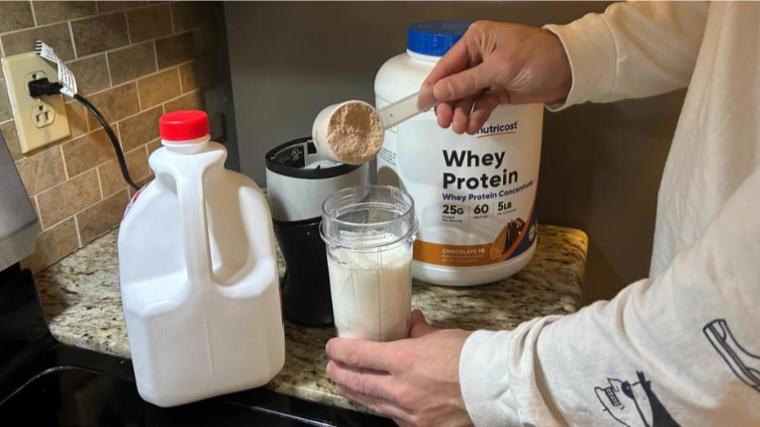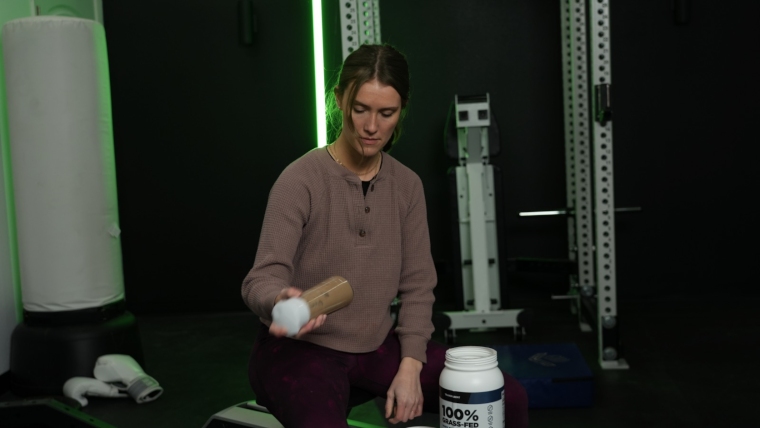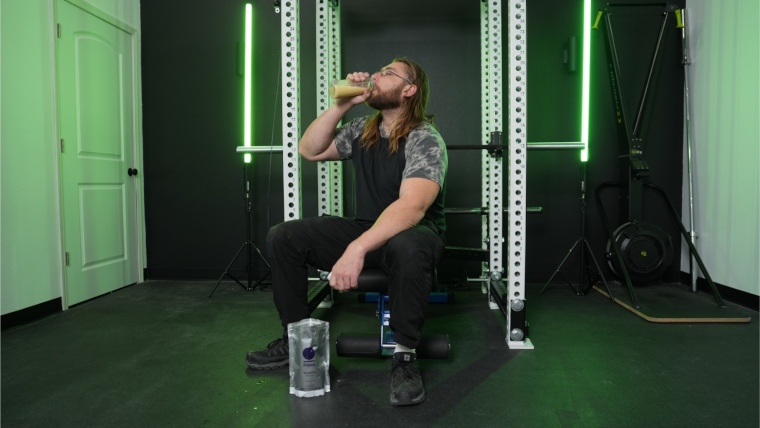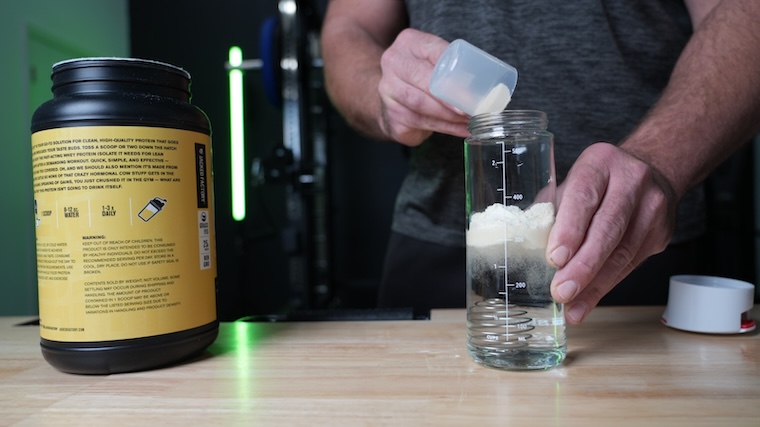When you’re looking to bolster your training regimen with a well-rounded supplement plan, odds are you’ll look for the best protein powders first. After all, would vitamin shops around the nation be stocked to the ceiling with tubs from varying brands if this foundational supplement wasn’t worth its weight? Marketing aside, hitting your daily protein goals, whether through whole foods or dietary supplements, can have you reaping some serious benefits in terms of health and wellness.
Proteins are found in each cell of your body and play important roles in a wide range of functions from digestion and tissue repair to immune system protocols and brain function. As such, the benefits of protein can be experienced by anyone — not just your dedicated athlete sweating through sessions in the gym. We’ve outlined some of our favorite perks associated with this vital macronutrient below along with key information as to why this powerful molecule should be a staple of your daily intake.
Key Takeaways:
- Protein is essential because it is the building block of life as it is found within every cell in our bodies
- Protein helps to grow and repair tissue, build muscle, and is a key energy source
- You should aim to consume 0.8 grams of protein per kilogram of body weight or 0.36 grams per pound (1)(5)(12)
- Animal proteins tend to contain all nine essential amino acids and are considered a complete protein while plant proteins are typically incomplete
Editor’s Note: The content on BarBend is meant to be informative in nature, but it should not be taken as medical advice. When starting a new training regimen and/or diet, it is always a good idea to consult with a trusted medical professional. We are not a medical resource. The opinions and articles on this site are not intended for use as diagnosis, prevention, and/or treatment of health problems. They are not substitutes for consulting a qualified medical professional.
Benefits of Protein
- Grows and Repairs Tissue
- Converts Food Into Energy
- Facilitates Cellular Communication
- Bolsters Your Immune System
- Enables Hypertrophy
- Supports Bone and Brain Health
- Regulates Digestive Health
1. Grows and Repairs Tissue
Every tissue and organ in the body contains proteins. Your intestines, bones, tendons, ligaments, and skin contain different types of a protein called collagen, which adds flexibility and elasticity.
[Related: Best Collagen Peptide Supplements]
Without collagen, your bone health would be greatly compromised as your bones would be brittle and your joints would be extremely unstable. Your muscle cells also contain specialized contractile proteins called myosin and actin, which bind temporarily and bend to produce a muscle contraction. (4)

Your skin, hair, and nails contain keratin, a protein that strengthens your hair and nails while helping to create a waterproof barrier on the surface of your skin. Some of the proteins in your cells are used for storage, like ferritin, which stores iron in your intestinal cells. (4)
2. Converts Food Into Energy
Protein can also take the form of enzymes, which catalyze chemical reactions in the body. Enzymes are used to digest food in the intestines and can also regulate metabolic processes. For example, the enzyme lactase is used to break down lactose — a sugar found in most dairy processes.
A cell receptor made of protein will allow the sugars to enter the cell where they can be used to make adenosine triphosphate (ATP) via a metabolic pathway catalyzed by enzymes (4). In short, ATP is the energy source that allows you to power through your day from HIIT workouts to running around completing errands, walking from room to room, and more.
3. Facilitates Cellular Communication
Cells communicate with each other in a number of ways that rely on proteins. In the nervous system, some neurotransmitters are made of proteins. Some hormones are made of proteins, too. These types of neurotransmitters and hormones bind to specific receptors (also made of protein) on the surface of a cell to initiate or stop a process within that cell. For example, when growth hormone binds to its receptor on a muscle cell, it initiates a process (catalyzed by enzymes) that activates muscle growth pathways. (4)
4. Bolsters Your Immune System
Your immune system uses a few types of proteins for cell-to-cell communication and fighting off infections. Antibodies are used to identify intruders as well as the body’s own cells, which normally prevents the immune system from attacking cells of the body. (4)

When an immune reaction is required, hormones called cytokines regulate the inflammatory process. Immune cells also produce proteins that can destroy infectious microbes and clean up damaged areas. (4)
[Related: Is Too Much Protein Powder Bad for You?]
5. Enables Hypertrophy
If a physique change such as weight gain or weight loss is your goal, protein is a real MVP for improving both size and strength thanks to its influence on hypertrophy in training. The amino acid leucine, specifically, is a potent stimulator of muscle protein synthesis, making it an important part of your post-workout meal. (5) Plus protein can help you increase your satiety somewhat, limiting how much you snack in-between whole meals.
Eating enough protein can also prevent some of the muscle loss that takes place when you’re in a caloric deficit. However, protein on its own can’t overcome the catabolic effects of a very low calorie diet, so it’s important to maintain a moderate deficit while you’re trying to shed some fat. (6) On the other hand, if you’re in a caloric excess to add some muscle mass, your body needs those spare amino acids from your dietary protein sources. (5)
6. Supports Bone and Brain Health
Despite the pervasive myth that animal proteins may cause bones to lose density, adequate protein intake is associated with higher bone mineral density, especially in the elderly. (7) This can be especially helpful when trying to combat or prevent such conditions as osteoporosis.

This is an important factor that protects against fractures and frailty, which can improve longevity and increase life expectancy. A lower-fat, higher-protein and carb diet is also associated with better cognitive function in older individuals. (8)
[Related: IAAF Protein Guidelines]
7. Regulates Digestive Health
Collagen is a component of the intestinal wall, and intestinal cells require plenty of the amino acid, glutamine. There’s no direct evidence that supplementing with either one will improve your performance, immune system, or body composition. (9) However, recent studies have shown that glutamine can reduce some symptoms of diarrhea-predominant irritable bowel syndrome (IBS-D). (10)(11)
Glutamine might also bring intestinal permeability (often called “leaky gut”) back to a normal level in people with IBS-D, which is associated with abnormally high permeability. Collagen, on the other hand, isn’t supported by any human trials yet.
Types of Protein
Protein is one of the three primary macronutrients (the other two being dietary fat and carbohydrate). It’s a composite of different amino acids bound together and then folded into “functional” shapes, each of which is suited for a different task in your body.
There are many different types of protein, each with a unique set and arrangement of amino acids — but they all have their own little important jobs to carry out behind the curtain. Read below to understand more on how protein-rich foods and high-quality protein supplements differ from one another.
Animal vs. Plant Proteins
Some amino acids are considered to be essential because they can’t be made in the body, so they have to be eaten in adequate amounts as part of your diet. When a dietary protein source is described as “complete” or “high-quality,” that generally means it provides all of the essential amino acids in adequate amounts. (1)
Animal proteins like meat and dairy are considered complete sources of protein. Most plant proteins are considered to be incomplete because they either wholly lack or have very low amounts of one (or more) of the essential amino acids. (1) This is why you’ll often see some of the best vegan protein powders containing added ingredients to achieve a full amino acid profile.

That said, healthy eating while abiding by a meat- and dairy-free diet can still be accomplishable provided you’re including a variety of protein sources such as beans, legumes, chickpeas, tofu, and whole grains (or if you choose to supplement your diet with, well, a supplement).
Whole Foods vs. Meal Replacements
It might seem like protein shakes (and even the best protein bars) are necessary for athletes and fitness enthusiasts to maintain a high-protein diet, but in reality, they’re a convenience, not a requirement. Protein supplements are quick, easy, and portable, so they’re helpful if you’re on the go or have a very high protein intake requirement.
Whole foods like chicken breast and Greek yogurt can promote post-workout muscle protein synthesis and glycogen replenishment just as effectively, though, and usually at a lower cost per serving.
If it’s difficult to meet your protein requirements with whole protein food sources, one of the easiest solutions is to add a protein shake or other protein supplement. (3) However, the best diet is one that features supplements as a complimentary piece of the puzzle rather than a sole contributor — they’re called supplements for a reason, after all.
How Much Protein Do You Need?
One of the biggest pain points of the scientific community is its frustrating but necessary stance of, “It depends” on most aspects of health. Fortunately, when it comes to determining protein intake (at least broadly), the literature is as close to crystal-clear as it gets.
Bodies like the World Health Organization or Food & Drug Administration tend to advise that most people consume a surprisingly low amount of protein on a daily basis — think in the ballpark of .3 to .5 grams per pound of bodyweight, per day. (12)
However, if you like to hit the gym on a regular basis or are a competitive athlete, your protein needs shoot up dramatically. This is because of protein’s vital supportive function for muscle growth and repair, among other factors.
Take our protein intake calculator for a spin and see for yourself:
Protein Intake Calculator
In the broadest of strokes, you should aim to consume about 1 gram of protein per pound of body weight, per day, if you exercise regularly (particularly if you lift weights). (13) You may even need a bit more than that if you’re an advanced trainee or are looking at cutting weight.
The Power Is in the Protein
Protein is a key ingredient for good health, and it goes way beyond helping you build muscle. It’s vital for every process in the body! Whether you’re an omnivore or a vegan, it’s best to include a variety of protein sources to meet your goals.
Protein powders aren’t a necessary addition to your diet, but they are a portable, convenient option then you’re on the go. By meeting your protein needs each day, you’re supporting your physique goals, longevity, and gut barrier. When it comes to protein, you really can’t go wrong.
FAQs: Benefits of Protein
What are the benefits of protein shakes?
Protein shakes can be a great tool for achieving and maintaining your daily protein counts as they’re far more portable and convenient than other protein sources like meat, dairy, and plant-based foods. However, you should aim to consume protein primarily from whole foods, if possible, in order to take in other vital macro and micronutrients that powders alone cannot deliver.
What happens when you eat more protein?
When you eat more protein, you unlock the benefits of the vital macronutrient which include better bone health, digestive health, strength, and muscle mass. That said, eating protein in excess can lead to some potential complications such as kidney stones, so it is always a good idea to consult with a trusted medical professional if you have certain questions related to your personal health and wellness.
How much protein do you need in a day?
While your protein intake goals can vary depending on your fitness aspirations, the general rule of thumb (based on recommendations from such bodies as the World Health Organization and Food & Drug Administration) is to consume 0.8 grams of protein per kilogram of body weight or 0.36 grams per pound. (12)
References
- 1. Spano, M., Kruskall, L., & Thomas, D. T. (2017). Nutrition for Sport, Fitness and Health. Human Kinetics.
- Hevia-Larraín, V., Gualano, B., Longobardi, I., Gil, S., Fernandes, A. L., Costa, L., Pereira, R., Artioli, G. G., Phillips, S. M., & Roschel, H. (2021). High-Protein Plant-Based Diet Versus a Protein-Matched Omnivorous Diet to Support Resistance Training Adaptations: A Comparison Between Habitual Vegans and Omnivores. Sports medicine (Auckland, N.Z.), 51(6), 1317–1330.
- Vliet, S. V., Beals, J. W., Martinez, I. G., Skinner, S. K., & Burd, N. A. (2018). Achieving Optimal Post-Exercise Muscle Protein Remodeling in Physically Active Adults through Whole Food Consumption. Nutrients, 10(2), 224.
- Martini, F. H., Nath, J. L., & Bartholomew, E. F. (2017). Fundamentals of anatomy & physiology, books a la carte edition (11th ed.). Pearson.
- Antonio, J., Candow, D. G., Forbes, S. C., Ormsbee, M. J., Saracino, P. G., & Roberts, J. (2020). Effects of Dietary Protein on Body Composition in Exercising Individuals. Nutrients, 12(6), 1890.
- Calbet, J., Ponce-González, J. G., Calle-Herrero, J., Perez-Suarez, I., Martin-Rincon, M., Santana, A., Morales-Alamo, D., & Holmberg, H. C. (2017). Exercise Preserves Lean Mass and Performance during Severe Energy Deficit: The Role of Exercise Volume and Dietary Protein Content. Frontiers in physiology, 8, 483.
- Ashley A Weaver, PhD, Janet A Tooze, PhD, Jane A Cauley, PhD, Douglas C Bauer, MD, Frances A Tylavsky, PhD, Stephen B Kritchevsky, PhD, Denise K Houston, PhD, Effect of Dietary Protein Intake on Bone Mineral Density and Fracture Incidence in Older Adults in the Health, Aging, and Body Composition Study, The Journals of Gerontology: Series A, Volume 76, Issue 12, December 2021, Pages 2213–2222
- Coelho-Júnior, H. J., Calvani, R., Landi, F., Picca, A., & Marzetti, E. (2021). Protein Intake and Cognitive Function in Older Adults: A Systematic Review and Meta-Analysis. Nutrition and metabolic insights, 14, 11786388211022373.
- Ramezani Ahmadi, A., Rayyani, E., Bahreini, M., & Mansoori, A. (2019). The effect of glutamine supplementation on athletic performance, body composition, and immune function: A systematic review and a meta-analysis of clinical trials. Clinical nutrition (Edinburgh, Scotland), 38(3), 1076–1091.
- Bertrand, J., Ghouzali, I., Guérin, C., Bôle-Feysot, C., Gouteux, M., Déchelotte, P., Ducrotté, P., & Coëffier, M. (2016). Glutamine Restores Tight Junction Protein Claudin-1 Expression in Colonic Mucosa of Patients With Diarrhea-Predominant Irritable Bowel Syndrome. JPEN. Journal of parenteral and enteral nutrition, 40(8), 1170–1176.
- Zhou, Q., Verne, M. L., Fields, J. Z., Lefante, J. J., Basra, S., Salameh, H., & Verne, G. N. (2019). Randomised placebo-controlled trial of dietary glutamine supplements for postinfectious irritable bowel syndrome. Gut, 68(6), 996–1002.
- Phillips, S. M., Chevalier, S., & Leidy, H. J. (2016). Protein “requirements” beyond the RDA: Implications for optimizing health. Applied Physiology, Nutrition, and Metabolism, 41(5), 565–572. https://pubmed.ncbi.nlm.nih.gov/26960445/
- Morton, R. W., Murphy, K. T., McKellar, S. R., Schoenfeld, B. J., Henselmans, M., Helms, E., Aragon, A. A., Devries, M. C., Banfield, L., Krieger, J. W., & Phillips, S. M. (2017). A systematic review, meta-analysis and meta-regression of the effect of protein supplementation on resistance training-induced gains in muscle mass and strength in healthy adults. British Journal of Sports Medicine, 52(6), 376–384. https://pubmed.ncbi.nlm.nih.gov/28698222/